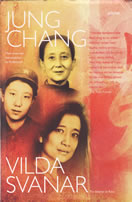
Their careers were destroyed, and her family was forced to leave their home.īefore her parents' denunciation and imprisonment, Chang had unquestioningly supported Mao and criticised herself for any momentary doubts. Her parents were publicly humiliated – ink was poured over their heads, they were forced to wear placards denouncing them around their necks, kneel in gravel and to stand outside in the rain – followed by imprisonment, her father's treatment leading to lasting physical and mental illness.

When Chang's father criticised Mao by name, Chang writes in Wild Swans that this exposed them to retaliation from Mao's supporters. They were targeted during the Cultural Revolution, as most high-ranking officials were. The failures of the Great Leap Forward had led her parents to oppose Mao Zedong's policies. In her memoirs, Chang states that she refused to participate in the attacks on her teachers and other Chinese, and she left after a short period as she found the Red Guards too violent. In Wild Swans she said she was "keen to do so", "thrilled by my red armband". Like many of her peers, Chang chose to become a Red Guard at the age of 14, during the early years of the Cultural Revolution. As communists were "deep red", she asked her father to rename her when she was 12 years old, specifying she wanted "a name with a military ring to it." He suggested " Jung", which means "martial affairs." 'Second Swan'), which sounds like the Chinese word for "faded red". The Communist Party provided her family with a dwelling in a guarded, walled compound, a maid and chauffeur, as well as a wet-nurse and nanny for Chang and her four siblings.Ĭhang writes that she was originally named Er-hong ( Chinese: 二鴻 lit. His formal ranking was as a "level 10 official", meaning that he was one of 20,000 or so most important cadres, or ganbu, in the country.

As a child she quickly developed a love of reading and writing, which included composing poetry.Īs Party cadres, life was relatively good for her family at first her parents worked hard, and her father became successful as a propagandist at a regional level.

Her parents were both Chinese Communist Party officials, and her father was greatly interested in literature. Chang was born on 25 March 1952 in Yibin, Sichuan Province.


 0 kommentar(er)
0 kommentar(er)
